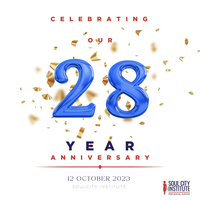The Soul City Institute Celebrates 28 Years of Social Impact
The year is 1992 in Alexendra Clinic, and the Soul City Institute for Social and Behaviour Change is born. Democracy was on the horizon and two young doctors wanted to address the apartheid legacy on mother and child health. Since then, what is now known as the Soul City Institute for Social Justice, has been concerned with the rights violations that gender minorities face in their daily lives, which determine their health outcomes.
As we celebrate 28 years in existence, we reflect proudly on the impact that we have influenced in social and behaviour change. Our brand Soul City, is loved and trusted amongst different generations, having reached 80% of South Africans through our Soul City and Soul Buddyz drama series.
Our in-school programmes such as the Soul Buddyz Clubs and the RISE Young Women Clubs have provided space for children, adolescents and young womxn to learn, create and become leaders in their communities and schools. Through our recent talk-show, It’s A Feminist Thing, we reached over 30 million South Africans, helping them unpack the detrimental impacts of violence against women, girls and LGBTQIA+ people. And our newly launched Feminist Leadership and Activism Centre, continues to build a feminist movement of young people who will reach their full potential with capacity to disrupt systems of oppression.
Now, in a time where we see sky rocketing numbers of teenage pregnancy, resulting from statutory rape, HIV infections among young women and the killing of LGBTQIA+ youth, we are more deliberate and apologetic about our feminist agenda.
Feminism is the struggle against patriarchal power and social injustice that perpetuates womxn’s inequality, oppression and discrimination. In South Africa, social justice was reflected in the anti-apartheid movement, which not only called for the abolition of racial discrimination, but also for the promotion of rights for womxn, workers and other vulnerable people.
SCI recognises that the realities and experiences of young womxn are shaped by patriarchy, which is the system of male authority that legitimises the oppression of womxn through political, social, cultural and religious institutions. This inspired us to adopt an intersectional approach in our work, to ensure that marginalised groups are prioritised and not left behind.
We have built a reputation as an effective voice that drives change through social and behavioural communication and thought leadership that builds visibility and advocates effectively. It is our dream to continue to advocate for gender equality, equity and social justice through multiple platforms such as mass media and digital media, by leveraging on the power of edutainment as an advocacy strategy, that will centre the lived experiences of young womxn and girls and provide platforms for their voices to lead.
We have heard the call from our various stakeholders to bring back Soul City TV and Soul Buddyz, in response to the various social ills that plague our communities, however the shift in funding, has left us with minimum resources, not enough to produce TV shows at this scale. However, we assure South Africans that our absence from their TV screens doesn’t mean that the Soul City they love and trust no longer exists. In schools, our Soul Buddyz Clubs continue to provide safe spaces for children to learn and unlearn, while our Rise Young Women Clubs are currently being rolled out in TVET colleges, in response to a growing need for social consciousness amongst this age group. Through our growing social media platforms, we continue to educate, engage and equip young people with information and resources to make healthy and informed choices.
We call on all members of society to support our vision to help womxn and girls fully realise their human rights in a just society, where they can live with dignity and self-determination and have the health and wellbeing to grow, flourish, and reach their full potential.
Our definition of young womxn is inclusive, based on how young womxn are impacted on by patriarchal oppression. It includes all people who self-identify as young womxn (gender non-conforming, including lesbian, bisexual, trans and intersex) between the ages of 10-35 years old.
For media queries
011 771 7973
disruptingpatriarchy@soulcity.org.za

